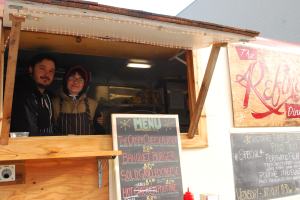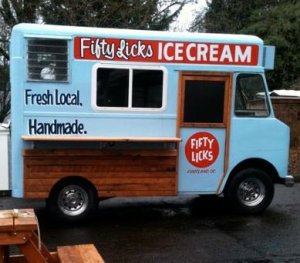I wrote this story a few weeks ago for The Martlet here in Victoria. It’s an interesting look at the world of food carts in Victoria with references to what has happened in Vancouver and Portland.
Food carts have become a bit of an obsession with me, and this started before I visited Refiner Diner. Stay tuned for some of my favourite food carts in the Pacific Northwest (and even Nelson) you should check out!
***
Wrapped in scarves and winter coats, keen diners eagerly wait for their lunches at the Quadra Street location of the Refiner Diner food truck.
Chef and Refiner Diner owner Jonathan Pulker, who works alongside his girlfriend, Jenessa Lenore, is bundled up with an apron hung over his neck. It’s an odd sight considering they are manning the grills and fryers of the truck, making fries, burgers, poutine and other fried goodies.
Even though the pair has only had their truck parked at Quadra and Caledonia for a couple of months, they have gained a loyal following (customers brave even the near-zero weather for a burger).
But while diners are enjoying the expansion of the food cart movement to the island, Pulker remembers a time when food carts were being pushed out of Victoria. Victoria used to be enamoured of the idea of white linen tablecloths and fine dining, but with fewer customers in recent years, restaurants were forced to reassess what they were doing.
Like many other cities, Victoria’s restaurant industry was hit by the 2008 recession. Diners looked for food options that satisfied not only their appetites but also their budgets.
“I don’t want to go to a place where the meal is going to be at least $50 and there is a waiter — that’s part of the appeal of a food truck,” says Pulker. “If you tip two bucks, you’re helping. It’s not offensive. You can feel good about spending $10 and tipping $2.
“Over time, more and more places started calling themselves ‘casual fine dining,’ and it flipped back to where people didn’t want to go out for white linen service,” says Pulker. “The food scene in general has become a lot more down-to-earth in the last decade or so. At one point in time, it would have made absolutely no sense to have a restaurant and say ‘home-style’ or ‘home-cooked’ or ‘homemade.’ ”
But the economy has not only shifted diners’ tastes; it has also created massive unemployment and reduced business opportunities. Entrepreneurs and small business owners have had to get creative to access a struggling market.
South of the border, Portland has experienced a massive surge of food carts.
“I think they are popular in Portland because everyone is broke,” says Portland’s Fifty Licks food truck owner Chad Drazin. “This town attracts people that are individualists and want to do their own thing and march to the beat of their own drum. But they are broke, so a food cart is the way to make a go of it.”
With between 400 and 600 food carts in the City of Portland, Portlanders have put themselves on the map as having one of the most vibrant food cart scenes in North America.
While working for the city, former Portland city planner Alma Flores became one of the most vocal advocates for food carts and the effects they have on their surrounding communities.
Like Pulker, Flores believes the peak of the recession was when the food cart movement exploded.
Similar to what has happened in Victoria, food carts didn’t set up shop on the street. Instead, owners began making deals with private property owners and developed “pods” of carts.
Flores says the evolution of food carts to their current state was a byproduct of the lack of rigidity in Portland’s policies. “Portland had really loose regulations for private property and didn’t know the outcome would be what we find now.”
Portland’s food cart culture began with businesses similar to those that have cropped up in Victoria. So far, Victoria food carts include Refiner Diner at Quadra and Caledonia, Taco Justice League at Cook Street and Pandora Avenue and Puerto Vallarta Amigos at Yates Street and Wharf Street.
“Personally, I would like to see the city a bit more relaxed as far as zoning, and let people use a lot — a place like this — and have a pod,” says Pulker in response to the City of Victoria’s policies. “That’s what we’re trying to do here.” He adds, “The landlord is into it; it’s just about licensing and bylaws now.”
While food cart owners are obvious advocates for the growing popularity of the movement, they have also found allies at the city council table.
Victoria city councillors Lisa Helps and Marianne Alto have been pushing for food carts since the day they were elected, but due to strapped resources, food carts didn’t make the list of council priorities for the term.
Despite the lack of discussion around food carts at City Hall, Helps is advocating for continued momentum.
“Small and local business and food security are really important issues for the future, and building sustainable communities,” Helps says. “If we can combine food and business together, I think it’s great. The other reason [why food carts are important] is everywhere I’ve been around the world where there is street food, it automatically adds vibrancy to the public realm.
“Victoria is a really walkable city, and it’s moderate in terms of climate, so they can open all year round. I think there is a real opportunity to create more vibrancy.”
While it is unlikely there will be any official food cart policy passed at City Hall during this council term, there is nothing council can do if food carts set up shop on private property.
Helps says even though there has been hesitation from brick-and-mortar businesses around city policy, she believes their concerns would be better met if there was one.
“It’s interesting . . . this is a bit of a conundrum because there are some downtown businesses (particularly restaurants) which are opposed to food carts. They are afraid they will take business away,” Helps says. “Now, there is an interesting catch-22 . . . currently there is no policy enabling food carts or food trucks in public spaces.” However, Helps says there is a provision whereby a food cart or truck operating on a private space, like a parking lot, is not subject to zoning restrictions. “There is nothing the city can do if all the licences are in good standing,” Helps says.
Conflicts have erupted between brick-and-mortar restaurant owners and their mobile siblings. Pulker, who has worked for many restaurants, including Pluto’s, the Empress and Prima Strada, was drawn to food carts because of the low financial overhead. But what he and other food cart owners see as a benefit, restaurants see as an unfair advantage.
“Businesses don’t want to see a truck on the street that they see as not paying any tax or rent or anything,” says Pulker. “They don’t want to see this uneven playing field. I disagree. I’m in my truck freezing my toes off, and that’s my choice. That’s what we call a free market economy.”
Pulker says he believes the Downtown Victoria Business Association (DVBA) wants to come up with a model where trucks pay a property tax according to their square footage.
As a DVBA board of directors member and the owner of the two retail locations of Habit Coffee, Shane Devereaux knows the economics of setting up shop downtown first hand.
“I feel both sides of the story,” he says. “Obviously, I pay a lot of rent, and if somebody pulled up in front of my shop and wanted to sling really good coffee, it would be unfair — and I think most people would agree with that.”
Having opened Habit first on Pandora Street and then in a second location in the Atrium building on Yates Street, Devereaux has seen the changes in the strength of downtown businesses.
“Downtown has its ups and downs, and I think we’re coming out of a down right now, so obviously people are going to be a bit more sensitive to the potential competition of a big food cart presence,” Devereaux says.
With the growing presence of food carts in Victoria, the DVBA has added food carts to its 2013 work plan. Devereaux says perhaps food carts could be charged a rental fee.
Devereaux says it’s unclear whether or not the association is for or against a policy in favour of food carts. Still, he says any downtown business association is going to advocate for the brick-and-mortar businesses first.
“I know our mandate is to animate and make downtown more attractive and bring more people, so anything that will encourage more vibrancy of the city would be of interest to City Hall and the business association,” he says.
As Victoria begins to look at which path it will take with food carts, the struggle between Vancouver food trucks and brick-and-mortar restaurants has escalated.
Late last year, two dozen restaurateurs dropped off letters of opposition against food carts to the City of Vancouver.
The business owners, along with B.C. Restaurant Association CEO and president Ian Tostenson, are asking city council for a moratorium on food cart licences.
“We were there at the beginning because we felt our sense of market would help the city develop their policies, so we did that,” says Tostenson. “We developed some common-sense approaches, which were things like proximity and food types, so there couldn’t be any overlap.”
The pilot project began with 17 licences in the first year, and due to overwhelming response, the following year the city gave out 19 licences. Out of 59 applicants in 2012, the city gave 12 new licences.
“It has been in the last year where problems began to develop,” says Tostenson.
As Vancouver food trucks began to park in front of brick-and-mortar restaurants, disputes emerged.
According to the city’s Street Food App, the majority of operating food carts are located within a six-block radius of each other, which doesn’t take into consideration all of the grab-and-go style restaurants serving a similar market.
“What happened was, because of that concentration and expansion, restaurants are feeling the heat,” says Tostenson. “If you look at the economics, in Vancouver a food cart pays $1 200 a year for a licence, and a restaurant that serves grab-and-go pizza could [pay] as much as $30 000 a year in property taxes. It’s a huge cost difference.”
Despite the opposition from brick-and-mortar restaurants, Vancouver city councillor and proponent of the city’s food cart policy Heather Deal told CBC News last year they would proceed with issuing 30 new licences in the next two years.
The City of Vancouver has begun revisiting its food cart policy following a motion from Non-Partisan Association councillor George Affleck to ensure the long-term viability of Vancouver’s restaurant industry, a sentiment mirrored by Tostenson.
“They need to and are taking a selective, studied approach,” Tostenson says. He says otherwise, food carts will become “like many things in Vancouver — like the bike lanes — they just keep going without seeing the bigger picture,” he says. “We’ve got some good carts out there right now, but it’s time to take a step back. At some point they are going to hurt everyone. If they start hurting food carts, their quality and service are going to suffer as well.”
But while cities grapple with the side effects of the food cart movement, operators like Pulker see it continuing to expand.
“I know food carts and trucks are going to keep growing in Victoria,” he says. “People see it brings vibrancy to a city to have stuff on the street and crowds of people gathering for food.”

